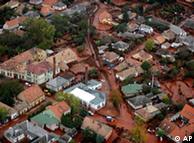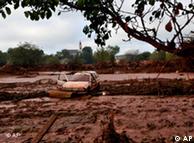DISASTERS | 08.10.2010
Hungary eases fears over Danube toxic sludge contamination
Fears that the Danube River, the second longest in Europe, could become contaminated after a toxic sludge spill have eased after Hungarian authorities said pollution levels in the river have dropped since Thursday.
Tibor Dobson, the regional chief of Hungary's disaster relief services, said fresh data showed acidity levels - or pH - of around 8.2 in the Danube, which could be considered "normal," down from a level of around 9 when the sludge reached the river on Thursday.
"These data give us hope ... and we have not experienced any damage on the main Danube so far," Dobson told news agency Reuters.
Further upstream at the confluence of the Raba and the Danube, which is closer to the site of the disaster, pH levels showed a reading of 9 and there were also still sporadic sightings of dead fish, officials said.
However, environmental group Greenpeace said in a statement on Friday that levels of arsenic and mercury detected in samples of the red sludge taken on Tuesday were twice that normally found in so-called red mud.
Call for help
 Many of the areas hit by the spill will be uninhabitable, officials say
Many of the areas hit by the spill will be uninhabitable, officials say
The announcement comes four days after a reservoir burst its banks at a rural alumina plant sending around 700,000 cubic meters (24,720, 000 cubic feet) of sludge streaming through nearby villages. The death toll from the spill stands at four, with another person said to be in serious condition in hospital.
The pollution already wiped out all life in the smaller Marcal tributary and there were fears it could spread down the Danube to Hungary's southern neighbors.
Hungary has since asked the European Commission to contribute at least three experts under the bloc's joint civil protection assistance measures.
Prime Minister Viktor Orban has said, however, that the country does not need financial assistance in removing the red slurry containing poisonous heavy metals from villages, fields and rivers.
Orban said that in some places, such as the hard-hit village of Kolontar, there was little point in removing rubble left behind by the spill as habitation of the areas would no longer be possible.
Author: Darren Mara (AFP/AP/dpa)
Editor: Chuck Penfold


No comments:
Post a Comment